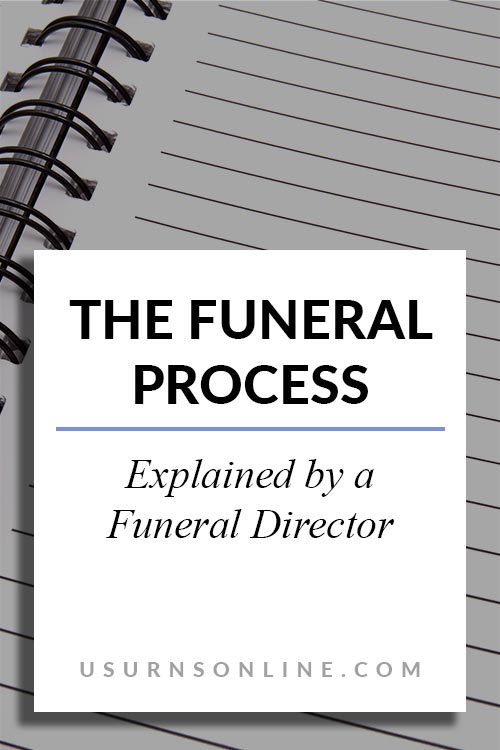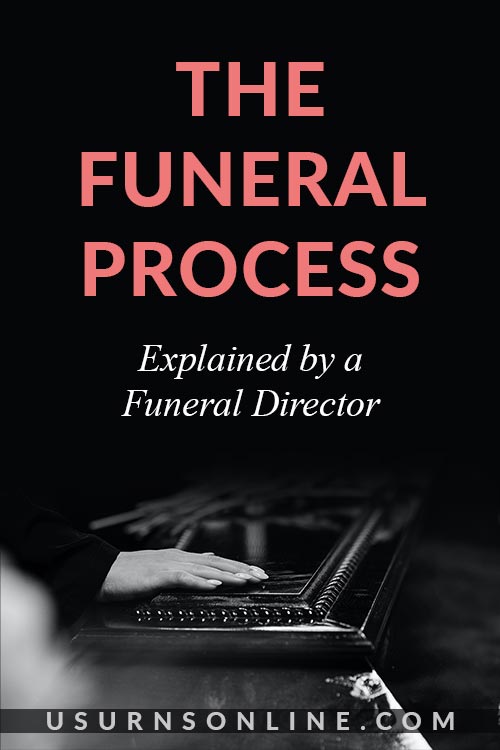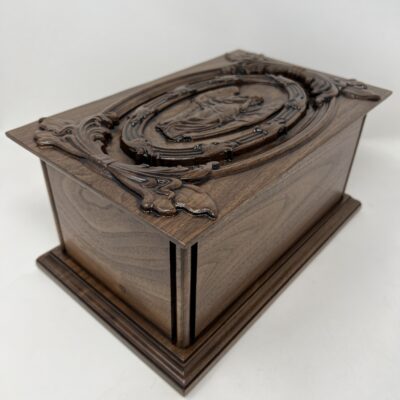Here’s how to plan a funeral, step by step.
I am a funeral director. I have been in the funeral industry for 15 years, and have planned hundreds of funerals.
These events have ranged from very simple funerals to incredibly over-the-top “celebrations.” I have dealt with all kinds of families – the ones that get along to the ones that want to throw punches in the arrangement office.
And I have loved every minute of my job.
So continue reading to discover what goes into the the funeral process, one step at a time.
The Funeral Process
Here is the process to plan a traditional funeral, from the time of death to burial.
1. Notify the funeral home
Once the death has occurred, call the funeral home of your choice.
Hopefully you have already chosen your funeral home. If not, make the appropriate phone calls.
If you are still price shopping, compare at least three funeral homes in your area. Remember that the least expensive doesn’t always mean the best deal.
2. Body transportation
The removal team will come to the place of death to pick up the body.
Urns Made in the USA
Depending on your town/city size, a removal team is usually at the scene within 30 to 60 minutes.
Learn more: What Happens to a Body After Death?
3. Body preservation
The body will be placed in refrigeration until embalming takes place.
If the family has consented to embalm, it might occur immediately upon the body arriving at the funeral home.
The next of kin has either signed an embalming authorization form or given verbal consent. This is something that you must choose to do – the next of kin must give consent to embalm. A funeral home cannot embalm without authorization.
If you have given verbal consent, you will sign the authorization form at the arrangement conference.
Learn more: What Is Embalming? Everything You Need to Know
4. Schedule the arrangement conference
The funeral director will contact you to set up an appointment to meet at the funeral home.
If the family is present at the removal, you might be able to set up a meeting time then. Quite often, the funeral director will be part of the removal team. Otherwise, expect a phone call.
5. Meet with the funeral director & plan the service
Now comes the time to actually iron out the details of the funeral plan. You’ll meet together at the funeral home to discuss every option and service that the funeral home provides.
We recommend that you bring a friend along with you to this meeting. Someone close, but also someone who is not grieving in the same way you are. They will be able to help you think clearly during this often difficult and confusing time.
Bring your loved one’s clothing, including underwear. If you have jewelry, let the funeral director know if you want it returned or buried with the body. If applicable, bring the life insurance policy.
Try to be on time. If you are running late, please call to let the director know.
At this meeting you will make many important decisions, which include the following:
a. Funeral service type
- Military
- Traditional with viewing
- Traditional without viewing
- Cremation with later memorial service
- Committal
Learn more: 10 Types of Funeral Services, Ceremonies, and Events
b. Funeral officiant
This is often a pastor, priest, or other clergy member. It could also be a family friend or relative, a professional celebrant, or even the funeral director.
Contact the officiant and make sure they are available and willing to officiate. The funeral director will typically do this for you, you will just need to provide the contact info.
Learn more: What a Funeral Officiant Does, and How to Find One
c. Service location
- Church
- Funeral home chapel
- Crematorium
- Graveside
- Rented facility
- Funeral at home
The funeral director will schedule the officiant as well as the church, funeral home, or graveside service for the family.
d. Cemetery or other final resting place
The funeral director will also call the cemetery and arrange for the family to meet with the sexton.
The director will discuss dates and times with the cemetery. Cemeteries don’t always have the availability that the family wants. The family, funeral director, and cemetery will discuss other options at this point.
If the family needs to buy a burial vault, they will usually purchase it through the cemetery.
Learn more: 13 Questions to Ask When Choosing a Cemetery
e. Funeral merchandise
The funeral director will then guide you through the funeral products you may need, want, or not need at all. Select only the merchandise and services you want to buy to honor your loved one.
- Casket. There will be several options available, in either metal or wood. If your loved one is being cremated, you can rent a casket for the funeral service. You can also order a casket online, which takes more effort on your part but can help lower your costs considerably.
- Cremation urn. The funeral home will have some lovely options. At Urns Northwest we have a wide selection of premium quality American-made urns to honor your loved one. Here are 12 of our favorites.
- Obituary. The funeral director will help you put an obituary together. Obituaries can be very expensive when placed in a newspaper. Ask the funeral director about placing the obituary on their website, which is a free service that most funeral homes offer, or you can create your own free memorial website here.
- Register book. Family and friends will sign this book when they arrive for the funeral. Here are some creative ideas.
- Funeral programs and prayer cards. A funeral assistant will hand the folders or prayer cards to the guests. We have some affordable and beautiful templates that you can easily create yourself within minutes.
- Flowers. Some funeral homes will order the flowers for you. The funeral home will have a book for you to choose from. If the funeral home doesn’t offer this service, you will need to go visit a local florist. Here’s a helpful guide to funeral flowers, and here’s what to ask for and how to say it when you don’t want flowers.
- Favors. These are keepsakes that you might want to give to attendees, little trinkets such as pins or plantable seed cards to honor your loved one’s memory. Here are 25 beautiful ideas.
Learn More: Complete Guide to Funeral Programs
6. Plan the reception
This might be a small gathering at your home or at a restaurant, or something larger in your church’s fellowship hall or some other rented venue.
You’ll want to plan:
- Location
- Food (catered, or potluck?)
- Table decorations and centerpieces
- Music, perhaps a slideshow
- Open mic sharing time
- Memorial activities such as having people fill out “my special memory of you” cards
Learn more: Funeral Reception Planning Guide
7. The funeral process on the day of the service
The funeral director will give you instructions on what time to arrive. Here’s what to expect for a traditional service:
- Seating. The funeral director seats the family at the front of the sanctuary.
- Pallbearers. The director talks to the pallbearers, instructing them of their duties.
- Parking. The director’s assistant will be in the parking lot instructing people where to park and how to get in line for the procession.
- Service. The officiant performs the service.
- Dismissal. A funeral assistant or the officiant dismisses the attendees.
- Final goodbyes. The family is allowed a few private moments before the casket is closed.
- Closing the casket. The casket is closed. (Read more about open vs closed casket funerals.)
- Hearse. The pallbearers take the casket and place it in the funeral coach.
- Funeral procession. The funeral coach leads the procession to the cemetery.
- Cemetery. At the cemetery, the pallbearers take the casket to the gravesite.
- Graveside service. The officiant performs a short committal service.
- Lowering the casket. A mechanical apparatus lowers the casket into the grave.
- Dismissal. The funeral director dismisses everyone upon completion of the committal ceremony.
- Reception. If a reception has been arranged, family and friends are directed where to go.
- Burial. Once everyone has left, the cemetery employees cover the grave with dirt.
What Every Funeral Director Wishes You Knew
There are some things we wish the public knew.
Funeral directors work to earn a living.
The funeral home is a business and must get paid. Expect to pay for everything up front. Most funeral homes do not accept cash.
If expenses are a concern, there are many ways to save money and cover costs. For instance, you can create a free memorial website that allows you to collect donations to offset funeral expenses. Read over these 50 tips for (cheap) funeral planning on a budget for more ideas.
Taxes must be paid.
You know the famous words of Ben Franklin: “In this world nothing can be said to be certain, except death and taxes.”
The funeral home does not make the laws regarding taxes on merchandise. Yes, there are taxes on each and every product. Yes, the family must pay those taxes.
The death industry is highly regulated.
We are governed by state occupational licensing statutes and the Federal Trade Commission’s Funeral Rule. We have laws that we must follow.
Yes, there are dishonest ones out there. With a little research, you can easily spot those. But by and large, the funeral homes operate honestly and ethically.
Funeral directors are trained.
Becoming a funeral director requires a very intense education. It typically involves a college-level degree, followed by apprenticeship and licensing. Funeral directors know what they are doing, and how best to help you.
Funeral directors serve.
Not only do we perform a much-needed service, but in doing so we often face health risks with people that have become infected with contagious diseases. This includes COVID-19, HIV/Aids, Creutzfeldt-Jakob Disease, TB, and many more.
We are not here to try to take advantage of you. Funeral directors often get into the industry after having experienced a loss, and have a deep desire to help other families during their time of need.
Funeral directors care.
We, funeral directors, are not desensitized to death. We have empathy and compassion for our families.
Things to Consider When Planning a Funeral
- Choose a local funeral home that you trust. It is important for you to feel comfortable.
- Informing others about the service. Here is an in-depth guide to funeral announcements & how to write one.
- Budget – it’s essential to have a budget and stick to it. Here are 50 Tips for a Funeral on a Budget.
- How will you pay? Credit, check, or life insurance policy. Many funeral homes don’t accept cash.
- Try to follow your loved one’s final wishes – even if you disagree with them.
- Consider the type of service you want – traditional, memorial, or graveside; religious or non-religious.
- Music – what type of music would your loved one want? Here are some of the best music choices for funerals.
I can promise you, funeral directors do not go into the business because of the money. We are funeral directors because we care.
We want to help people through the hardest part of their lives. Our hours are long and unpredictable. We miss our own family functions and holidays. But we don’t complain. We care about you, and are here for you 24/7.
Helping people through the funeral process is a calling, not a job.
We love what we do.
Read next: Death Announcements: What to Say, and How to Say It






Great read! I am going back to school to become a funeral director here in NC. I love that you say, ” This is a calling, not a job” Thank you for this information.